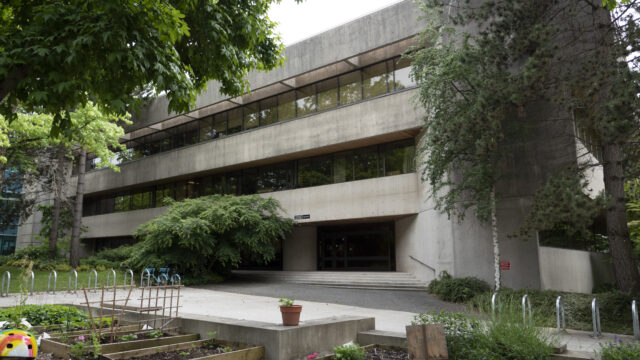Food and Nutritional Sciences is a competitive double major, combining the core degree requirements of the Food Science and Nutritional Sciences programs. You’ll discover the chemistry and microbiology of food, its nutritional and sensory properties, and the function of nutrients in health and disease, and graduate ready for a career in the food and nutrition industries or graduate-level study in health sciences.
Why this program?
- Integrate knowledge of food science, nutrition, and human health to contribute towards healthier and safer food choices for our world.
- Gain a comprehensive understanding of two interrelated fields in only five years.
- Interact with industry experts through research partnerships, the LFS Mentorship Program, food plant visits, and career days.
Program information
Send details- Campus: Vancouver
- Faculty: Faculty of Land and Food Systems
- Degree: Bachelor of Science in Food, Nutrition, and Health
- Length 5 yrs
-
Co-op
Yes
You can combine your studies with full-time, paid work at top local and international organizations.
-
Honours
No
You can study intense specialization in a single field.
UBC’s Food and Nutritional Sciences degree has the added distinction of being approved by the Institute of Food Technologists (IFT): the internationally respected governing body that sets the standards in Food Science education. By choosing this double major, you’ll be eligible to apply for Canadian Institute of Food Science and Technology (CIFST) scholarships and other food science-specific student funding. You’ll also have access to the IFT Student Association events and opportunities to collaborate with other students across North America.
Experiential learning and research
This double major emphasizes hands-on experience through foundational science and food-specific laboratory courses. You’ll also be able to take part in community-based learning through the Land, Food, and Community series, where you’ll investigate regional, national, and global food systems that are ecologically, socially, and economically sustainable.
Additionally, you can build business skills through hands-on opportunities such as working at the student-run Agora Cafe or at food industry co-op placements.
Campus features
The department of Food, Nutrition and Health has spacious chemistry and microbiology laboratories that are used only for undergraduate teaching, providing you with with plenty of space to work on your experimental projects. As well as the teaching kitchen and sensory evaluation space, you’ll spend time in the Pilot Plant facility, which is a modern analytical research laboratory used to develop new food products in sustainable ways.
Send detailsLife at UBC's Vancouver campus
This popular program is located on the beautiful UBC Vancouver campus. You’ll learn from skilled researchers and teachers who bring their disciplinary expertise, instructional skills, and industry experience into the classroom.
Find out moreYour future
Many graduates of Food and Nutritional Sciences pursue an MSc or PhD in Human Nutrition or Food Science, or a professional MFS in Food Science. Others go on to careers in the food and nutrition sectors, in positions such as:
Program graduates
- Food product development technician
- Quality assurance manager
- Nutrition educator
- Consumer product officer
- Food technologist
- Pharmaceutical sales representative
- Microbiology technician
- Food safety specialist
Program requirements
English-language requirements
English is the language of instruction at UBC. All prospective students must demonstrate English-language competency prior to admission. There are numerous ways to meet the English Language Admission Standard.
General admission requirements
IB Diploma Programme
- Completed IB Diploma, including at least three Higher Level courses.
IB Certificate Courses
- IB Certificate courses (Standard and Higher Level) may be used in an admissions average if you are graduating from a recognized high school curriculum that can be used as your basis of admission.
- IB Math Applications and Interpretations SL, or IB Math Studies, do not satisfy the math requirement for admission to UBC’s science-based programs, the Faculty of Management, the UBC Sauder School of Business, or the Vancouver School of Economics.
Degree-specific requirements: Food, Nutrition, and Health
- IB Math Analysis and Approaches SL or HL, or IB Math Applications and Interpretations HL. (IB Math Applications and Interpretations SL, or IB Math Studies, are not acceptable.)
- One of IB Biology, IB Chemistry, or IB Physics
- Grade 11 or equivalent Chemistry, and
- Grade 11 or equivalent Physics (may be waived with grades of 5 in IB Chemistry and in your IB Mathematics course)
Note: Grade 11 Chemistry and Physics requirements listed are only relevant to students who are not completing the equivalent IB Diploma Chemistry and/or Physics courses.
For students studying outside of Canada, some examples of courses that may be accepted as Grade 11 equivalents are junior-level courses for American students, and IGCSE and O Level for those following British-patterned curricula.
Related courses
The following subject categories are particularly relevant for this degree. Consider taking courses in these areas in your junior year and senior year.
- Language Arts
- Mathematics and Computation
- Sciences
- Social Studies
